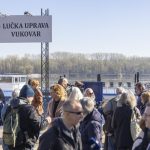ZAGREB, March 24, 2019 – Prime Minister and HDZ president Andrej Plenković said on Saturday that the European Parliament election would be called on March 26. “If the United Kingdom leaves, it means the election of 12 Croatian MEPs. In the event of some unforeseen circumstances, a possible extension of the Brexit deadline we set for May 22, then legally, in the first stage, we would elect 11 MEPs, and if (the UK) leaves, not just we but other countries too would have 12 MEPs.”
Asked about a meeting of the state leadership in the president’s office earlier on Saturday, Plenković said he met with President Kolinda Grabar-Kitarović and Parliament Speaker Gordan Jandroković every four to six weeks and that they discussed all current matters.
Speaking to the press in Krapinske Toplice, where he attended a ceremony marking the 29th anniversary of the HDZ party’s Krapina-Zagorje County branch, he said Croatia was prepared for both Brexit scenarios.
Asked about Social Democratic Party president Davor Bernardić’s claim that the HDZ needed the law on the financing of political activities to legalise its slush funds, Plenković said “this degree of disastrous statements is below every level of rude, even slanderous statements” and that they were put in the context of a rational decision to give citizens more benefit from electioneering.
The campaign for the EP election “will last 45 days and you have only 1.5 million kuna per slate. A party can invest its own funds or seek contributions, and we raised the limit,” he said, adding that even with the increase Croatia “is one of the countries with the smallest funds for campaigning.”
He said it was important that Croatian citizens understood that as those spending more in the campaign would motivate people to vote in the EP election. He said the “anti-European sovereignists are clueless and it’s important the public knows that, and they didn’t lift a finger for Croatia to join the European Union.”
Asked about the government’s position on a Slovenian court’s non-final jail sentence against Croatian fishermen for fishing in Savudrija Bay, Plenkovic said the government supported all Croatian fishermen who were being fined by the Slovenian authorities.
He reiterated that Croatia did not recognise the “compromised” arbitration procedure and ruling on the border with Slovenia and that it wanted to discuss and resolve the problem with Slovenia.
More news on the European elections can be found in the Politics section.








